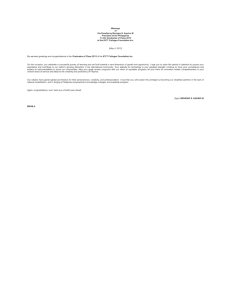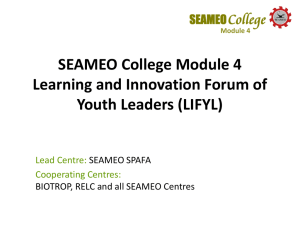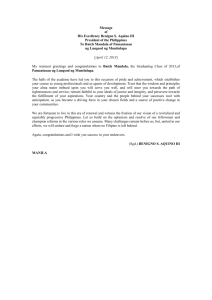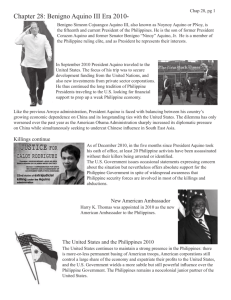B7-de Jesus_R1 - Management Institute for Quality-of
advertisement
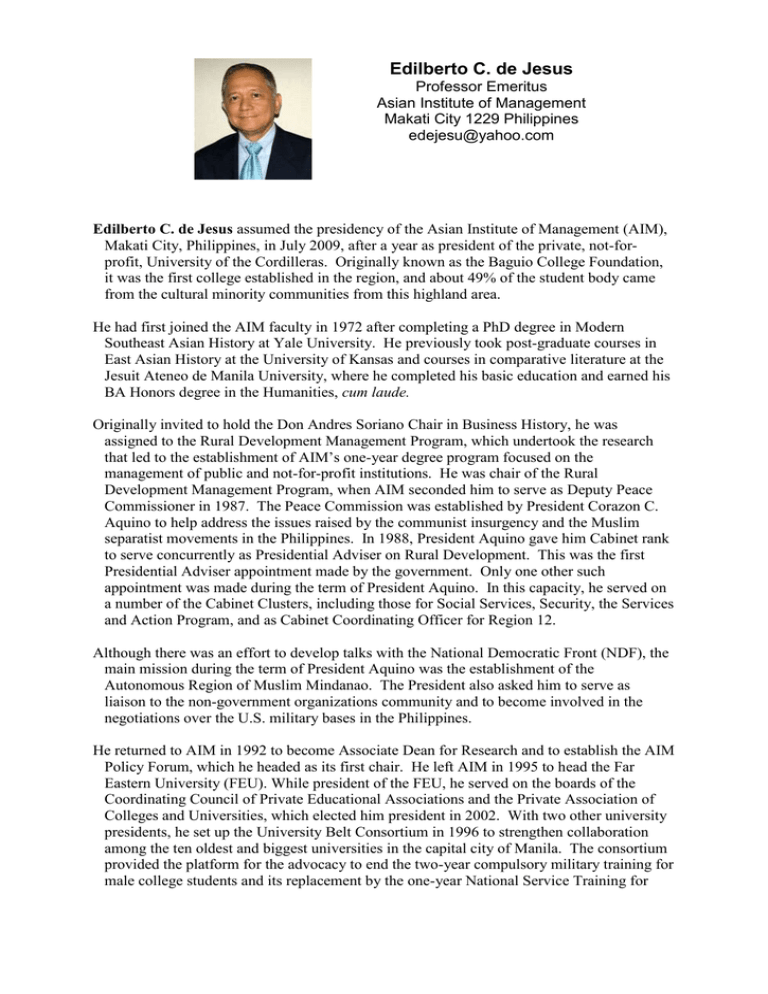
Edilberto C. de Jesus Professor Emeritus Asian Institute of Management Makati City 1229 Philippines edejesu@yahoo.com Edilberto C. de Jesus assumed the presidency of the Asian Institute of Management (AIM), Makati City, Philippines, in July 2009, after a year as president of the private, not-forprofit, University of the Cordilleras. Originally known as the Baguio College Foundation, it was the first college established in the region, and about 49% of the student body came from the cultural minority communities from this highland area. He had first joined the AIM faculty in 1972 after completing a PhD degree in Modern Southeast Asian History at Yale University. He previously took post-graduate courses in East Asian History at the University of Kansas and courses in comparative literature at the Jesuit Ateneo de Manila University, where he completed his basic education and earned his BA Honors degree in the Humanities, cum laude. Originally invited to hold the Don Andres Soriano Chair in Business History, he was assigned to the Rural Development Management Program, which undertook the research that led to the establishment of AIM’s one-year degree program focused on the management of public and not-for-profit institutions. He was chair of the Rural Development Management Program, when AIM seconded him to serve as Deputy Peace Commissioner in 1987. The Peace Commission was established by President Corazon C. Aquino to help address the issues raised by the communist insurgency and the Muslim separatist movements in the Philippines. In 1988, President Aquino gave him Cabinet rank to serve concurrently as Presidential Adviser on Rural Development. This was the first Presidential Adviser appointment made by the government. Only one other such appointment was made during the term of President Aquino. In this capacity, he served on a number of the Cabinet Clusters, including those for Social Services, Security, the Services and Action Program, and as Cabinet Coordinating Officer for Region 12. Although there was an effort to develop talks with the National Democratic Front (NDF), the main mission during the term of President Aquino was the establishment of the Autonomous Region of Muslim Mindanao. The President also asked him to serve as liaison to the non-government organizations community and to become involved in the negotiations over the U.S. military bases in the Philippines. He returned to AIM in 1992 to become Associate Dean for Research and to establish the AIM Policy Forum, which he headed as its first chair. He left AIM in 1995 to head the Far Eastern University (FEU). While president of the FEU, he served on the boards of the Coordinating Council of Private Educational Associations and the Private Association of Colleges and Universities, which elected him president in 2002. With two other university presidents, he set up the University Belt Consortium in 1996 to strengthen collaboration among the ten oldest and biggest universities in the capital city of Manila. The consortium provided the platform for the advocacy to end the two-year compulsory military training for male college students and its replacement by the one-year National Service Training for both male and female college students, which could be fulfilled, at the student’s option, through military or law enforcement or community service. His appointment as Secretary of Education in 2002 required his resignation from FEU. Through the remaining two years of the first Arroyo administration, he led the department in promoting the use of the mother tongue as the medium of instruction in the first three years of elementary education and in demonstrating the need for, and the feasibility of, extending basic education from 10 to 12 years. President Gloria Arroyo approved the offering of an 11th year in basic education, but at the point of implementation, decided to make the additional year optional. The current administration of President Benigno Aquino III has made the establishment of K12 a priority goal in education. He served in 2003 as the president of SEAMEO (Southeast Asia Ministers of Education Organization) and initiated the move to coordinate the work of SEAMEO and the Association of Southeast Asian Nations, which also wanted to promote educational objectives. He declined to serve in the second Arroyo Administration but served from 2005 through 2007 as Secretariat Director of SEAMEO. Based in Bangkok, SEAMEO promoted collaboration among the education ministries of the 10 ASEAN countries and oversaw the activities of 12 SEAMEO Regional Centers in eight member countries. These Centers conducted research and training in specific areas of study, such as agriculture (Philippines), tropical medicine (Thailand), vocational-technical training (Brunei), and information technology (Indonesia). De Jesus was a Fellow of the Institute of Southeast Asian Studies in Singapore and taught as a Visiting Fulbright Professor at the University of Michigan in Ann Arbor. He stepped down as president of AIM on 15 August 2012 but accepted an appointment as an AIM Professor Emeritus.
